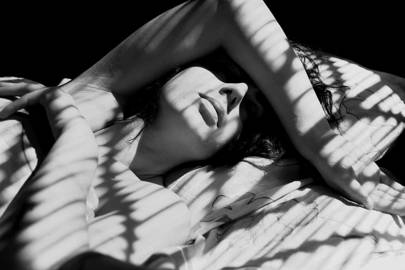
Are you an early riser or a night owl? Can you get by on as little as six hours, or do you need double digits to feel rested? Sleep used to be something that simply happened once dinner was eaten, the day was done, and our eyes would stay open no longer. Now, the pursuit of the perfect night’s sleep has become the ultimate wellness goal, and sleep itself has inched into becoming a billion dollar business.
Silicon Valley tech bros have tried to “hack” it with micro-naps, ice packs attached to their bodies and electrodes strapped to their heads. The wellness brigade is proponents of the polar opposite: removing technology from your bedroom altogether for “clean” sleeping. Or perhaps you’re more of a luxury snoozer, with a Casper mattress, Olivia Von Halle pajamas and Neom Organics candles to scent the room – Cult Beauty has seen 121% growth in searches for their ‘sleep’ category, while night-time skin treatments have grown as a category some 320%.
It marks a definite shift from the ’90s heyday of “work hard, play hard” when bragging about how few hours you’d had the night before was a badge of honor. Of course, poor quality sleep is nothing new (Aristotle complained of insomnia in 350BC, so don’t let anyone lambast you for loving late-night Netflix), but the difference is now when a colleague tells you they slept poorly, they have the data to back it up. “Only 32% quality last night”, their app will tell them.
On the one hand, caring more about sleep is essentially positive. UCLA neurologist Professor Matthew Walker who has been running a sleep clinic for eighteen years, said there are positives to the movement.. “We undoubtedly know that a lack of sleep is bad for your health, both in the short term with poor judgment and memory, and also in the long term, with potential links to Alzheimer’s,” he explained. Professor Walker also noted that he’s relieved people are moving away from burning the candle at both ends so often, given that a primary cause of road traffic accidents is still sleeping deprivation. “Sleep deprivation can affect you in a way that essentially puts you over the alcohol limit,” he added.
Essentially, our perception of sleep is wrong, according to Professor Walker. “We all have different capacities for sleep deprivation. The general rule is that most people need seven or eight hours, with some deviation from that. You may feel guilty that a friend claims that they ‘only need’ five hours, but they may catch up at the weekend – a pattern that’s not always sustainable.”
Thatcher-esque requirements aside, Professor Walker also pointed out that waking in the night is common. “Almost everybody wakes during the night, around two or three times. The difference is that most of us fall asleep again, but if you’re anxious, that anxiety may trigger you to stay awake longer and then not be able to sleep again.” The other factor to consider is how the cycles of sleep work, and it turns out there is a little truth in the old adage that the best sleep happens before midnight. “The deepest sleep usually happens in the first third of being asleep,” explained Professor Walker. “The two thirds that follow are generally lighter sleep and dream sleep. Quite often, people say to me that they’ve been awake for hours by the time they have to get up, but often, they are sleeping, just so lightly.” Essentially, anxiety can render light sleep positively featherweight, and any dreams you’re having may be both so mundane and unsettling that it doesn’t feel like rest at all.
It’s also worth noting that to feel tired sometimes is normal – you are only human, and humans do not fire on all cylinders all day, every day. Hoping to remove tiredness or fatigue from your life altogether will be about as fruitful as attempting to eliminate your own hunger, or need to sneeze. “Generally, we measure tiredness not by how you feel immediately on waking, but on how difficult you find it to stay awake during the day, using something called the Epworth Scale,” added Professor Walker.

The professor’s advice? “Go to bed, and get up!” he laughed, noting that attempts to return to a “caveman” style of sleeping were an unhelpful fad. His advice for treating insomnia was to get to the root of it, suggesting an NHS-sponsored online sleep cognitive behavioral therapy course called Sleepio, which is free in many parts of the country. Otherwise, his general snoozing tips were to keep your bedroom for sleeping, and not for working or spending idle hours scrolling on your phone, trying to maintain a regular routine, and minimizing general blue light exposure before bed.
We all must sleep to live, and anything that helps you on your way, be that thousand thread count sheets or whale music, is indeed an investment in your health. As for power naps, “clean” sleeping, wearable trackers and the rest of that ilk? Sleep on it.
